Navigating the icy roads of winter is no simple feat, but selecting the right tire for the season can make all the difference. Whether you're a savvy shopper seeking the best tire brands or an enthusiast chasing performance details, our comprehensive tire test review promises to guide you.
The Age-old Debate: All-season Vs. Winter Tires
Manufacturers, including giants like Volvo, have ventured into promoting all-season tires as the future standard for year-round driving. Yet, real-world applications have proven differently. Winter's unpredictable nature necessitates tires designed to cater to its unique challenges. While all-season tires might be a jack of all trades, mastering winter terrain isn't their strong suit. For optimal tire performance, the recommendation remains clear: fit winter tires for icy seasons and summer ones for warmer days.

Choosing the Perfect Winter Tire
Different winters present different challenges. A temperate winter with minimal snow requires tires tailored for near-freezing wet roads, delivering almost similar performance as summer variants. However, these don't compare to the tire durability and grip provided by tires designed for snow-rich regions.

The Trade-offs of Wear and Tear
Quality doesn't exclude a tire from the natural wear and tear. Surprisingly, even the esteemed Nokian Hakka 8, a repeated winner in winter tire tests, showed decreased performance levels once worn. This exemplifies that even the best tire brands can't guarantee sustained tire performance over time.

The Eastern Promise: Chinese Tires
Despite making commendable progress in summer tire development, Chinese brands like Antares and Linglong still lag in the winter category, especially when juxtaposed with their European counterparts. Their braking distances and overall performance simply can't match up to their European rivals.

Dive into the Test Details
Curious about the contenders? Here's a list of the tires that braved the icy trials:
Studded Contenders:
- Antares Grip 60 Ice
- Bridgestone Blizzak Spike 3
- Continental IceContact 3
- Goodyear UltraGrip Arctic 2
- Hankook Winter i*pike RS2
- Kumho WinterCraft Ice Wi32
- Michelin X-Ice North 4
- Nokian Hakkapeliitta 10
Friction Tires:
- Bridgestone Blizzak Ice
- Continental VikingContact 7
- Falken Winterpeak F-Snow 1
- Goodyear UltraGrip Ice 3
- Hankook Winter i*cept iZ2
- Kumho WinterCraft Ice Wi51
- Linglong Nord Master
- Michelin X-Ice Snow
- Nokian Hakkapeliitta R5
- Nordexx Wintersafe 2
- Pirelli Ice Zero Asimmetrico
Special Mentions:
- Nokian Hakkapeliitta 8 (worn, studded)
- Continental WinterContact SI (worn, not studded);
- Continental ContiWinterContact TS 870 (new, eurowinter);
- Continental AllSeasonContact (new, all-season).
Tests were meticulously conducted at the Test World proving ground in Ivalo, Finland. From acceleration on snow and ice to braking on different terrains, each tire faced a series of challenges to truly gauge its performance and safety features.
Final Thoughts
Winter driving demands top-notch tire performance. Studded tires indeed reign supreme on ice, though they falter on asphalt. Cheap winter options, unfortunately, compromise safety. Worn winter tires, irrespective of their brand prestige, deteriorate in performance much quicker than their aesthetic decline suggests.
In your tire buying guide, remember: quality, fit for purpose, and regular checks are crucial. Don't let a worn-out or ill-suited tire compromise your safety this winter.
Test Results: A Deep Dive into Winter Tire Performance
In the unforgiving conditions of icy terrains, friction tires took the initial challenge. While all showcased some level of slipperiness, certain models stood out – but not always for the right reasons. The Continental IceContact 3, for instance, demonstrated some resilience with a hint of grip. In contrast, the all-season Continental AllSeason Contact seemed to forget its moniker entirely, faltering significantly across acceleration, steering, and braking parameters, akin to butter skidding on a hot skillet.
Dry Braking
- Conti "A/S"
- Conti "Worn"
- Bridgestone
- Conti 870
- Nokian 8
- Continental
- Falken
- Kumho
- Nokian
- Hankook
- Pirelli
- Goodyear
- Linglong
- Antares
- Nordexx
- Nokian
- Continental
- Goodyear
- Kumho
- Michelin
- Hankook
- Bridgestone
- Michelin
Info! Dry braking, m. (Bold: Studded tires)
Wet Braking
- Conti "A/S"
- Conti 870
- Nokian 8
- Linglong
- Conti "Worn"
- Antares
- Continental
- Falken
- Goodyear
- Michelin
- Kumho
- Nokian
- Kumho
- Bridgestone
- Bridgestone
- Hankook
- Goodyear
- Hankook
- Michelin
- Pirelli
- Continental
- Nokian
- Nordexx
Info! Wet braking, m. (Bold: Studded tires)
Emerging as a beacon of hope amidst these preliminary tests, the Nokian Hakkapapeliitta 10 painted an impressive picture. Following the shaky performance of its counterparts, this tire as reassuring as driving on clear asphalt. It epitomized balance and design, facilitating a comfortable driving experience even while cornering in a controlled skid. A testament to the tire's impeccable design and its emphasis on safety.
However, the worn-out studded Hakka 8, even with all its studs intact but reduced to a meager 0.6 mm from the optimal 1.2 mm, proved disappointing. Its compromised grip led the test car astray, straight into a snowdrift. This emphasized the paramount importance of regular tire checks and maintenance.
Ice braking
- Bridgestone
- Nokian
- Goodyear
- Hankook
- Kumho
- Michelin
- Continental
- Kumho
- Continental
- Hankook
- Michelin
- Goodyear
- Falken
- Nokian
- Pirelli
- Antares
- Nokian 8
- Nordexx
- Linglong
- Bridgestone
- Conti "Worn"
- Conti 870
- Conti "A/S"
Info! Ice Braking, m (Bold: Studded tires)
Snow braking
- Continental
- Michelin
- Continental
- Goodyear
- Falken
- Hankook
- Michelin
- Nokian
- Bridgestone
- Goodyear
- Conti "Worn"
- Nokian
- Conti 870
- Hankook
- Kumho
- Kumho
- Bridgestone
- Nordexx
- Nokian 8
- Pirelli
- Antares
- Linglong
- Conti "A/S"
Info! Snow braking, m (Bold: Studded tires)
Drawn from rigorous testing, key takeaways are:
- Studded Over Smooth: Studded tires dominate icy terrains but reveal their Achilles' heel on asphalt, demonstrating reduced stability.
- Budget Woes: Economical winter tires are yet to match their premium counterparts in ensuring safety on icy or snowy roads.
- Eastern Evolution: While Chinese brands have substantially upped their game in the summer tire segment, their winter models continue to play catch-up with established European brands.
- The Wear and Tear Dilemma: High-end brands aren't immune to the effects of wear and tear. Worn winter tires, irrespective of their premium lineage, show a steep decline in performance, surpassing even the visible loss of studs. Furthermore, friction tires, especially those rich in natural rubber, tend to degrade and become slippery over seasons. Similarly, studded tires, with receding studs, see a marked reduction in their efficacy.
In essence, the tire industry's winter segment is a blend of innovation, intense competition, and evolving technology. For consumers, the key lies in understanding these nuances, prioritizing safety, and making informed decisions. Whether you're diving into a tire buying guide or seeking insights on tire safety features, remember, the right tire can be the difference between a comfortable drive and a winter mishap.
Below are the test outcomes accompanied by concise summaries for each participating tire.
Tire Test Concluded: Discover the Best Performers
Studded Tires
Studded tires are winter's answer to treacherous icy roads, providing unparalleled grip thanks to their metal or plastic studs. These protrusions bite into the ice, offering drivers enhanced traction, shorter braking distances, and increased confidence in frigid conditions. However, before investing, it's crucial for drivers to familiarize themselves with regional regulations concerning studded tire usage and to weigh the benefits against potential road wear and noise.
1st Place: Nokian / Hakkapeliitta 10 - Rated 8.1
![]() Quick Take
Quick Take
Nokian Hakkapeliitta 10

The Nokian Hakkapeliitta 10 delivers exceptional grip and quick steering responses on icy surfaces. While it offers dependable control even at higher speeds on snowy terrains, it's slightly less impressive on wet and dry asphalt. Yet, it's one of the quieter tires in its category.
Pros: Superior grip and driving dynamics on ice and snow.
Cons: Mediocre performance on wet and dry asphalt.
2nd Place: Continental / IceContact 3 - Rated 7.9
![]() Quick Take
Quick Take
Continental IceContact 3

A standout for its impeccable handling on icy and snowy terrains. While its braking grip on ice could be better, its overall winter road performance ranks high. However, its higher rolling resistance is something to note.
Pros: Stellar winter road performance, unmatched grip on snow.
Cons: Elevated rolling resistance.
3rd Place: Michelin / X-Ice North 4 - Rated 7.7
![]() Quick Take
Quick Take
Michelin X-Ice North 4

This tire guarantees safety and comfort on both ice and snow. While its steering might not be the sharpest on ice, its traction compensates for it, especially on snowy roads. Plus, its performance on wet asphalt is commendable, and it promises quiet rides.
Pros: Exceptional grip and handling on icy terrains and snowy roads.
Cons: None noted.
4th Place: Goodyear / UltraGrip Arctic 2 - Rated 7.6
![]() Quick Take
Quick Take
Goodyear UltraGrip Arctic 2

Showcasing balanced performance on icy surfaces, this tire excels in acceleration, braking, and handling. Its performance on snow and wet asphalt is commendable, but its rolling resistance is on the higher side.
Pros: Balanced and top-tier performance on winter roads.
Cons: Elevated rolling resistance.
5th Place: Bridgestone / Blizzak Spike-03 - Rated 7.3
![]() Quick Take
Quick Take
Bridgestone Blizzak Spike-03

With more studs than its competitors, it boasts of excellent braking and handling on ice. However, its responsiveness on wet and dry asphalt might be a tad underwhelming for some users.
Pros: Robust grip on ice and stability in ruts.
Cons: Underwhelming performance on wet and dry asphalt, noise levels, and slower responsiveness.
6th Place: Hankook / Winter i*Pike RS2 W429 - Rated 7.3
![]() Quick Take
Quick Take
Hankook Winter i*Pike RS2 W429

This tire promises excellent braking and lateral grip on ice. Its snow handling is also worth noting. However, its performance on dry roads might leave room for improvement.
Pros: Superior grip on ice and commendable snow handling.
Cons: Underperforming on dry asphalt.
7th Place: Kumho / WinterCraft ice Wi32 - Rated 7.3
![]() Quick Take
Quick Take
Kumho WinterCraft ice Wi32

The Kumho shines for its braking and controllability on icy terrains. It also boasts a good performance on snowy roads. However, its noise levels and comfort on uneven asphalt might be a concern for some.
Pros: Exceptional braking on ice and control on icy and snowy roads.
Cons: Noise levels and discomfort on rugged roads.
8th Place: Antares / Grip 60 ice - Rated 5.4
![]() Quick Take
Quick Take
Antares Grip 60 ice

The Antares might have its strength in its grip on dry asphalt. But its performance on icy, snowy, and wet terrains could be better.
Pros: Solid grip on dry asphalt.
Cons: Compromised grip and handling on ice, snow, and wet pavements.
Friction Tires
Friction tires, also known as non-studded winter tires, are engineered to grip cold, slippery surfaces without the use of metal studs. Utilizing unique rubber compounds and tread designs, these tires remain flexible in freezing temperatures, offering improved traction on ice and snow. While they may not provide the same bite on ice as their studded counterparts, friction tires are quieter, less abrasive to the roads, and are permitted in areas where studded tires are restricted.
1st Place: Continental / VikingContact 7 - Rated 7.7
![]() Quick Take
Quick Take
Continental VikingContact 7

Continental showcases a stellar performance akin to studded tires, promising precision steering and unwavering stability on snowy terrains. However, its wet grip might leave you wanting more.
Pros: Masterful snow navigation; commendable grip on icy terrains without studs.
Cons: Compromised wet grip.
2nd Place: Goodyear / UltraGrip Ice 3- Rated 7.5
![]() Quick Take
Quick Take
Goodyear UltraGrip Ice 3

With Goodyear's impeccable grip on icy tracks, driving feels transparent and predictable. Not the champion on snow, but its wet and dry pavement performance sets it apart.
Pros: Stellar grip and handling on snow; well-rounded tire traits.
Cons: Not specified.
3rd Place: Nokian / Hakkapeliitta R5 - Rated 7.1
![]() Quick Take
Quick Take
Nokian Hakkapeliitta R5
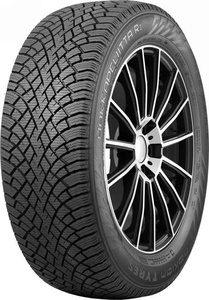
Nokian offers a seamless drive on icy landscapes with its commendable lateral stability. Snowy roads? It's got you covered. Just be wary on wet asphalt.
Pros: Praiseworthy performance on ice and snow; energy efficiency with low rolling resistance.
Cons: Slips on wet terrains.
4th Place: Michelin / X-Ice Snow - Rated 7.0
![]() Quick Take
Quick Take
Michelin X-Ice Snow

Michelin stands out on snowy roads, providing a drive so smooth you'd almost forget about the weather. Its performance dips on dry roads, though.
Pros: Superior grip and maneuvering in snowy conditions; energy-efficient.
Cons: Falls short on dry terrains.
5th Place: Hankook / Winter i*cept iZ 2 W616 - Rated 6.8
![]() Quick Take
Quick Take
Hankook Winter i*cept iZ 2 W616

Promising ice grip and adept handling, Hankook does falter slightly with aggressive steering. Snowy roads are a breeze, but caution is advised on wet terrains.
Pros: Impressive ice braking and handling; low rolling resistance.
Cons: Wet roads can be tricky.
6th Place: Kumho / WinterCraft Wi51 - Rated 6.8
![]() Quick Take
Quick Take
Kumho WinterCraft Wi51

With brakes that grip ice like a vice and remarkable stability on snow, Kumho makes winter driving feel like a summer breeze. However, icy terrains can be challenging.
Pros: Strong ice brakes; tenacious grip on snow; energy efficiency.
Cons: Can be unpredictable on icy roads.
7th Place: Falken / Winterpeak F-Snow 1 - Rated 6.5
![]() Quick Take
Quick Take
Falken Winterpeak F-Snow 1

The Falken tire is an icy road enthusiast's dream, but it demands foresight on the snowy roads. Wet terrains? Not its strong suit.
Pros: Stellar snow braking; ensures a quiet and comfortable ride.
Cons: Wet asphalt challenges its prowess.
8th Place: Pirelli / Ice Zero Asimmetrico - Rated 6.2
![]() Quick Take
Quick Take
Pirelli Ice Zero Asimmetrico
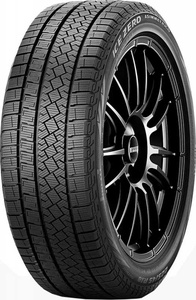
Pirelli promises a decent icy brake performance, but lateral movements can be daunting. Its forte lies in snowy terrains, but it grapples with rutting on dry roads.
Pros: Commendable snow performance.
Cons: Wavers on icy landscapes; struggles on wet terrains.
9th Place: Linglong Nord Master - Rated 6.1
While Linglong may not be the ice master, its performance on wet asphalt is unparalleled. Just tread cautiously on icy and snowy tracks.
Pros: Dominates on wet asphalt.
Cons: Challenges on ice, snow, and dry terrains.
10th Place: Bridgestone / Blizzak Ice - Rated 6.1
![]() Quick Take
Quick Take
Bridgestone Blizzak Ice

Bridgestone might not ace the icy grip test, but it promises a manageable drive even on the most slippery roads. However, it loses traction on wet roads.
Pros: Manageable icy terrain handling; smooth rides even on rugged roads.
Cons: Struggles on wet asphalt.
11th Place: Nordexx Wintersafe 2 - Rated 6.0
Nordexx may not impress on icy roads, but at low speeds on snowy terrains, it's reliable. Wet and dry roads? Not its playground.
Pros: Reliable at low speeds on snowy tracks.
Cons: Slips on icy landscapes; struggles on both wet and dry roads.
Atypical Tires for Winter
Atypical tires for winter, such as worn tires and all-season varieties, can pose significant risks during severe winter conditions. The test results clearly indicated that these tires are ill-equipped to handle the challenges of harsh winter terrains. It is crucial for drivers to avoid relying on these non-specialized tires during extreme cold seasons to ensure safety and optimum vehicle performance.
Nokian Hakkapeliitta 8 (Worn, Studdable) - Rated 5.8
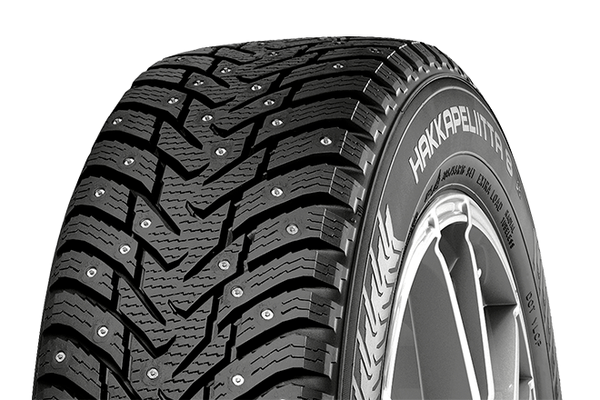
The four-year veteran, Nokian Hakka 8, previously a multiple test winner, still retains all of its 190 studs per tire. However, the stud protrusion has decreased to 0.6 millimeters from its original 1-1.2 millimeters, alongside a reduced tread depth by half. Consequently, its icy traction has declined, falling behind many newer studded tires in terms of braking and lateral stability. The diminished tread depth on snow now aligns the Nokian Hakka 8 closer to an all-season tire.
Continental WinterContact TS 870 (For European Winters) - Rated 5.6
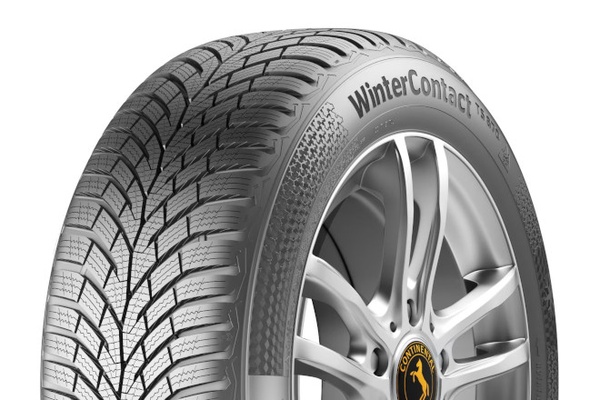
Designed for the occasional snowfalls that transform into slush in Central Europe's mild winters, the Continental WinterContact TS870 is tailored for these "European winters". It shines in handling tests on both wet and dry asphalt. Additionally, these tires fare decently on snow and even manage some grip on icy roads.
Continental WinterContact SI (Worn, Studless) - Rated 5.2
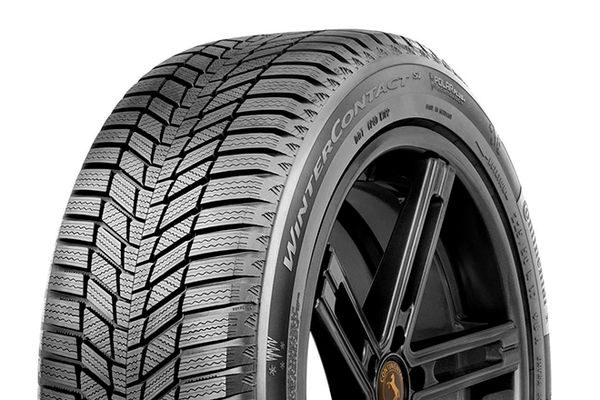
The 2015 iteration of Continental's studless tire retains half its original tread depth. Although its performance on ice and snow has deteriorated, it still outperforms all-season tires on slippery terrains. Yet, when compared to new tires, it lags on wet and dry surfaces.
Continental AllSeasonContact (All-Season) - Rated 4.7
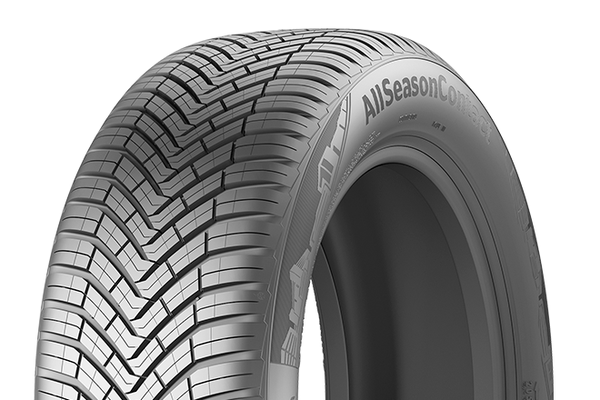
Gaining traction in Europe and other mild climates, all-season tires, like the Continental AllSeasonContact, offer a balanced compromise for both summer and winter. However, they might not excel in any specific season. In regions with severe winters, like Sweden, they're not the best fit due to their lackluster grip on ice and snow. Performance-wise, on dry and wet terrains, they're comparable to summer tires, making them a preferred choice during the transition seasons.









